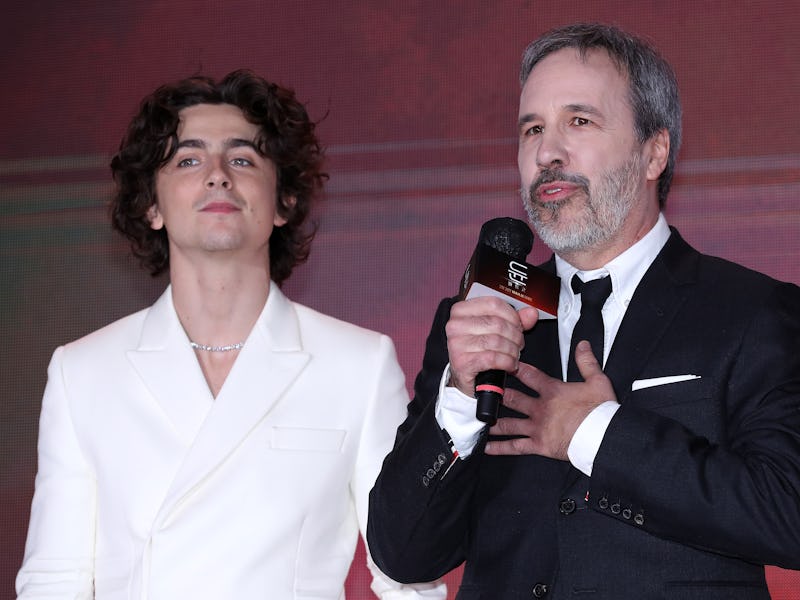Denis Villeneuve’s Next Big Sci-Fi Epic is the Complete Opposite of Dune
Rendezvous with Rama will be his riskiest movie yet.

From Arrival to Blade Runner 2049 to both of his Dune movies, Denis Villeneuve clearly knows a thing or two about how to translate nuanced, high-concept sci-fi into artistic, crowd-pleasing films. In fact, if it weren’t for Deadpool & Wolverine, Villeneuve’s Dune: Par Two would be the number one money-making non-family film of the year. (Despicable Me 4 and Inside Out are slightly ahead of Dune 2 for the year.) The point is, despite the underwhelming performance of Blade Runner 2049 in 2017, and the shaky ground Dune: Part One stood on in 2021, Villeneuve has emerged as an artist who appears to make the kinds of movies he wants — movies that people want to see.
So, with the third Dune film, Dune Messiah, still very much in development limbo, what can we expect from Villeneuve’s other big science fiction project, the much-discussed adaptation of Arthur C. Clarke’s Rendezvous with Rama? The short answer is: don’t expect it to be anything like Dune. And, if Villeneuve is very smart, he and his collaborators will make Rama very different from its source material.
Why Rama is the opposite of Dune
Arthur C. Clarke in 1974.
Obviously, science fiction exists on a big spectrum of subgenres, many of which Frank Herbert’s Dune does a good job at shattering, or at the very least circumnavigate. Dune is a political science fiction novel, which can also be read as epic fantasy. It can’t be called Hard SF, simply because the technology itself is presented more matter-of-factly, and yet technology is central to the Dune story. It’s a work of soft sci-fi, that is epic and small, but transgressive, profound, and often confounding.
At the risk of sounding reductive, Rendezvous with Rama is a bit easier to define: It’s an epic work of speculative science fiction that firmly favors its concepts over its characters. Anecdotally, even huge fans of Clarke would struggle to name 10 characters in Rendezvous with Rama off the top of their head. Contrast this with Dune, in which characters are arguably everything. Frank Herbert wrote a lot of novels that weren’t his six Dune books, but none of those other books have characters as memorable as Paul Atreides, Jessica, Chani, Baron Harkonnen, and Duncan Idaho. Famously, Rama author Arthur C. Clarke compared Dune to The Lord of the Rings, and it's easy to see why: Both series have incredible casts of characters, with intricate backstories and various stories that go in different directions.
However, Rama — at least the original novel by Clarke — isn’t like that. It’s a fairly self-contained novel about a semi-sentient mysterious alien starship that enters our solar system and is explored by human astronauts. Villeneuve has called the concept “Arrival on steroids,” and it’s easy to understand why. Both stories deal with the elusive concept of how to communicate with a truly alien intelligence and both stories pose perhaps more questions than answers.
But, how would Villeneuve and his collaborators adapt Rama? What would it look like?
Foundation is the greatest modern lesson for a Rama adaptation
Foundation has changed the game in adapting older sci-fi novels.
Among science fiction giants of the so-called “Golden Age,” Isaac Asimov’s Foundation novels are often mentioned alongside the works of Arthur C. Clarke and Frank Hebert. But like Clarke (and unlike Herbert), Asimov’s Foundation books suffer from a common problem found in many, many classic SF books: The concept trumps the characters.
This is a limitation that David S. Goyer was clearly aware of when he adapted Foundation into the hit Apple TV+ series it’s become. And although Foundation rejects much of the structure from the Asimov books and invents entirely new motivations, arcs, and power structures, it manages to honor the basic philosophical ideas of the books, but with a unique, character-driven spin.
The triumph of Foundation in 2021 was very different than Villeneuve’s Dune: Part One. Whereas the first Dune film was largely faithful to its source material, Foundation thrived by making radical changes. And it's this kind of strategy that Villeneuve should probably borrow from in making Rendezvous with Rama. A fully faithful adaption of this Arthur C. Clarke novel won’t translate to film, which means for Rama to be a truly great science fiction film, Villeneuve will need to utterly reinvent it.